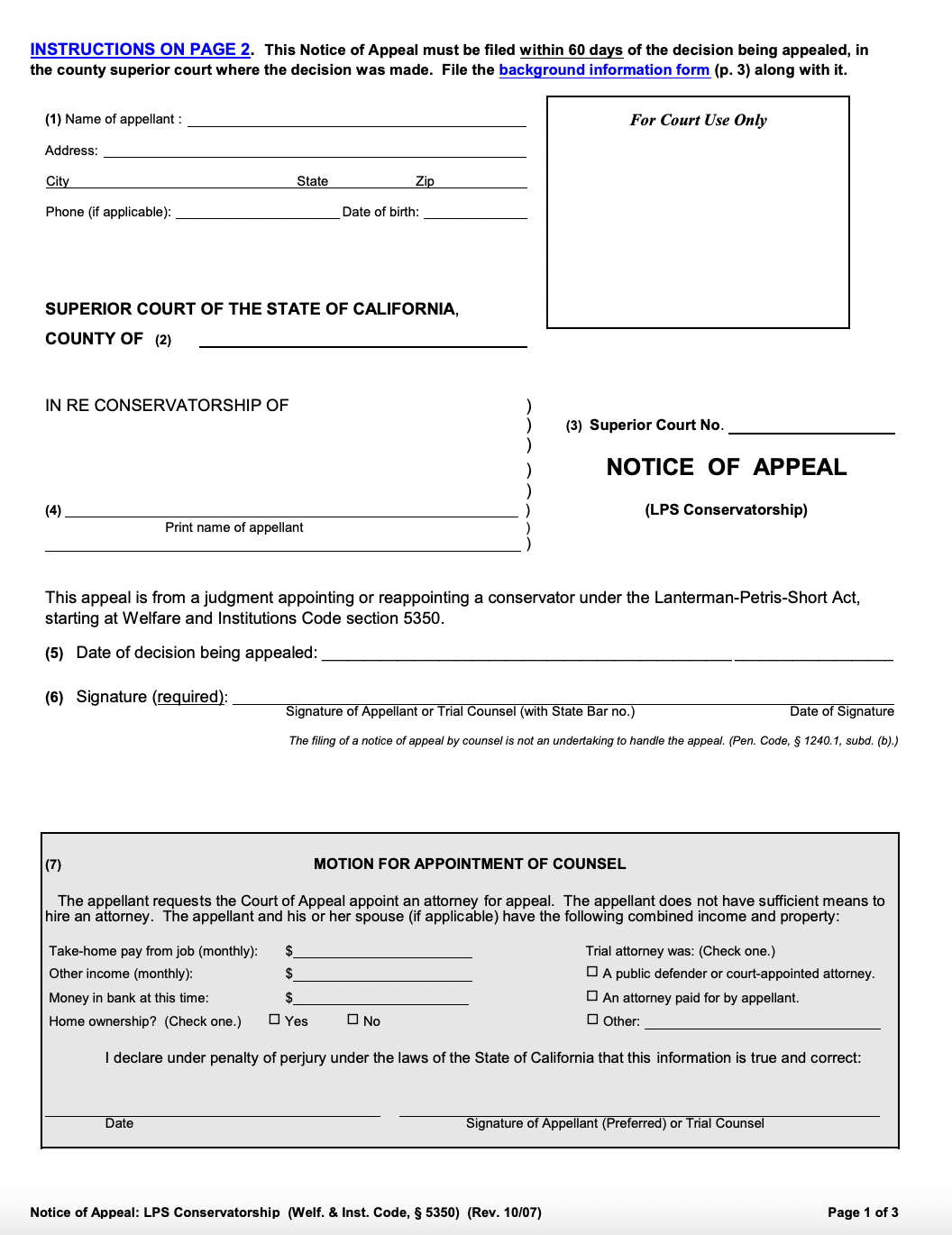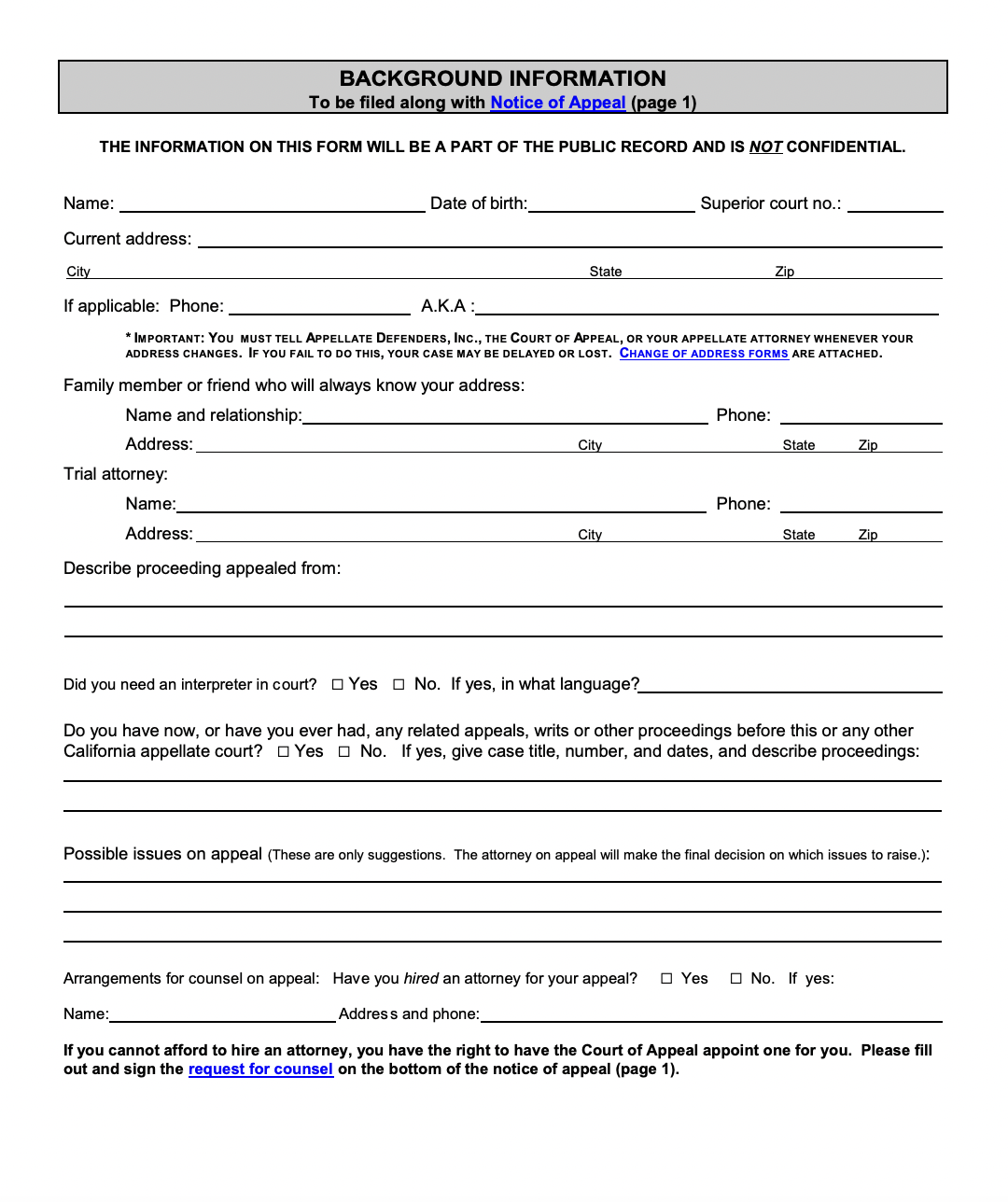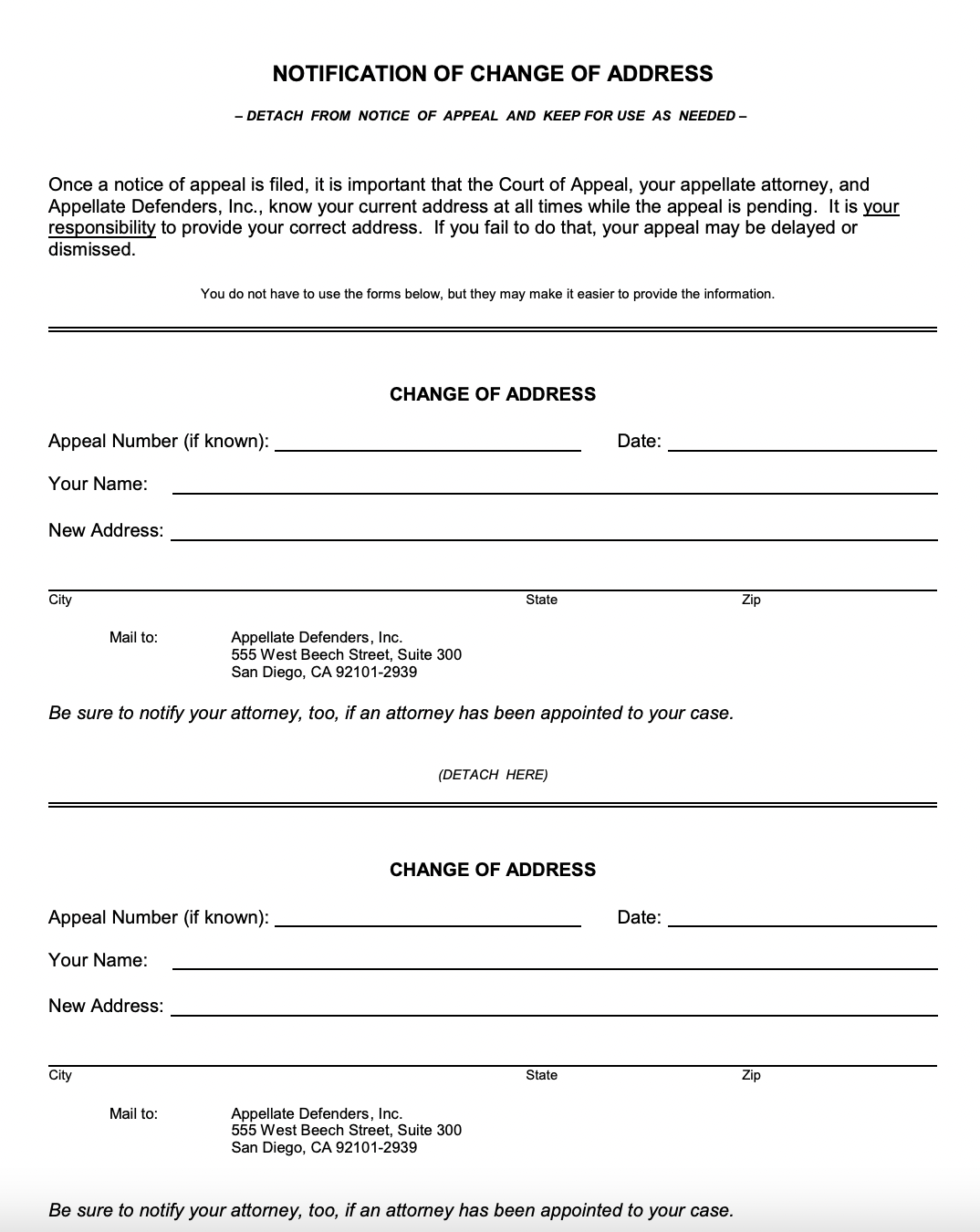when do i file a notice of appeal?
When do i file a notice of intent to file a writ?
When do I file a request for a rehearing?
|
Rehearings: Patients can petition the court for a rehearing on the issue of establishment of permanent conservatorship. They are given statutory right to request a rehearing once every six months codified by WIC § 5364. When conservatees request a rehearing the conservatee carries the burden of proof showing that they are do not meet the criteria for current grave disability. Conservatees do not have the right to a jury trial at the rehearing pursuant to Welf and I C § 5364.
|
Writ of habeas corpus: Patients can during the 14 day, 30 day, and T-con periods ask their counsel to file a writ of habeas corpus. This is a special writ proceeding that is fundamentally a request for the court to release the person from an "illegal confinement". Conservatees and/OR patients need be aware that most writ petitions are not won.
*Special exceptions apply to LPS conservatorship proceedings including rehearings and initial permanent conservatorship hearings. |
Appeals:
Patients can petition the court of appeal to review the decision of the lower trial court if they believe that the trial court made an error in establishing a conservatorship or if there was some other procedural defect. An appeal is not a "de novo" trial. It is simply a review of the trial court's record and anything dehors the record will not be reviewed by the appellate court.
Patients can petition the court of appeal to review the decision of the lower trial court if they believe that the trial court made an error in establishing a conservatorship or if there was some other procedural defect. An appeal is not a "de novo" trial. It is simply a review of the trial court's record and anything dehors the record will not be reviewed by the appellate court.
RehearingS
Conservatees are entitled to petition the court every 6 months for a rehearing as to his or her status as a conservatee. Conservatees if they decide to petition the court for a rehearing, carry the burden of proof of proving that by a preponderance of the evidence that they are no longer currently gravely disabled in re Baber v Superior Court (Hill) (1980) 113 CA3d 955. Different courts may use different legal terminology but generally the bench officer will be looking to determine if there have been changed circumstances. This is when that plan of care form will strongly bolster a patient's case. There is no right to a jury trial when it comes to petitioning for a rehearing.
Conservatees and/or patients may also be allowed to challenge the rights denied under Welf & I C §5357 (voting, driver's license, right to contract, and consent to general medical treatment) and/or the placement and medication powers given to the conservator. These hearing vary from county to county so consult with appointed counsel about how to raise this issue.
Conservatees and/or patients may also be allowed to challenge the rights denied under Welf & I C §5357 (voting, driver's license, right to contract, and consent to general medical treatment) and/or the placement and medication powers given to the conservator. These hearing vary from county to county so consult with appointed counsel about how to raise this issue.
WRIT OF HABEAS CORPUS
A conservatee may challenge his or her placement or conditions of confinement by a writ of habeas corpus under the provisions of Welf & I C §7250 and, under certain circumstances, under Pen C §1473. Judicial review of the writ must be in the county where the conservatorship was established or in the county in which the conservatee is placed. Welf & I C §5358.7. The Pen C §1473 writ is available, but to sustain such a writ, the party would have to allege that "unreasonable consequences [would] ensue because of the limitations of the [LPS] statutory review mechanisms." In re Gandolfo (1984) 36 C3d 889.
APPEAL PROCESS
Many conservatees have appointed counsel who knows little of the appellate process. The appellate process is different from that of juvenile dependency in which different issues will be considered for review. Generally appealable orders are challenged through an appeal and non appealable orders can only be challenged through writ petitions.
If a conservatee wishes to appeal a judgement, the appeal is started by filing a notice of appeal with the clerk of the superior court. Time is crucial. Counsel must file the notice of appeal in a timely manner. This requirement is jurisdictional; should counsel fail to file on time, the appeal will be dismissed. Special exceptions may apply.
The appellate court receives that notice of appeal while the clerk/trial court puts together the record. The court of appeal processes assigns a case number which is used to identify the case when searching for it. The court of appeal will send an appeal packet to the appellate lawyers who will review the case. It takes a while to receive the trial court's documentation so the appellate attorneys will not be fully informed about the appeal until later. A panel attorney is the person who will do the initial review of the trial court record to determine if there are appealable issues. Conservatees are not granted a de novo review by the appellate judge. A panel attorney may review the record and if the appellate counsel finds no arguable issues, he or she should inform the court and file a no issue brief setting out applicable facts and law that serve as the basis for the court to dismiss the appeal. In re Conservatorship of Ben C..
The briefing stages take a long time. The appellant’s opening brief is due within a certain number of days. The public conservator's reply brief needs to be filed within 30 days. Appellant has a select number of days to file their response brief to the public conservator.
If the record is not complete then the reviewing panel attorney has to file a request to ask the trial court clerk to transmit the missing documentation. Appeals are reviews of the trial court record; no new evidence or documents dehors the record may be proffered. Very rarely extensions of time are granted but the court usually denies.
Oral arguments follow the briefing stage. Generally, parties must give notice if they wish to make an appearance and provide an oral argument. The case will be marked as submitted if a party wishes to make an appearance. If no one wishes to make an appearance, then they will send back notice of waiver of oral argument and the case will be marked as submitted. The panel attorney will make a decision based on the trial court record and current case law.
The court of appeal will issue an opinion within a certain number of days after receiving the case is “submitted”. The opinion will provide the appellate court’s reasoning and deference to particular statue and case law. There is a period of time for several potential actions to be taken. There can be a request for rehearing, writ of certiorari, and/or publication/depublication. If the parties choose not to act then the next step will happen.
The court will issue a remittitur which will send the case back to the trial court and the trial court must proceed in accordance with the new guidelines set forth by the appellate court’s opinion.
Generally, it takes around a year for all of the above to happen. Appeals do not happen quickly nor are they a chance for the appellant to have a second try at their case. The court of appeals will only look at the issues proffered in the appellant’s opening brief on the merits. Conservatorships are generally not stayed as the appeal goes forward.
In general, the duty of competence requires that counsel understand appellate procedure and the substantive law pertaining to the case at hand. However, reality is not a lot of lawyers are going to know the appeal process and preserving the record.
Sample notice of appeal Forms
REquesting independent review
Conservatee appeals the superior court's order reappointing the Public Guardian as the conservator. Appellate counsel filed an opening brief that failed to raise arguable issues and asked the court to exercise its discretion to independently review the record per (People v. Wende (1979) 25 Cal.3d 436) or at a minimum to conduct a level of review consistent with the findings in (Conservatorship of Ben C. (2007) 40 Cal.4th 529, 544). In accordance with Ben C., appellant. was provided with a copy of the brief and informed of the right to file a supplemental brief. Appellant did not do so. Appellate counsel acknowledges that Wende review is only available in criminal appeals. However, appellate courts that have recently dismissed prior appeals regarding subject matters of similar nature as moot. is not always predictive. Given the "private interests at stake" and the "restraints upon physical freedom and personal autonomy" at issue, an appellate court can choose to convene Wende review in said instance.
COURT OF APPEALS WEBSITES


